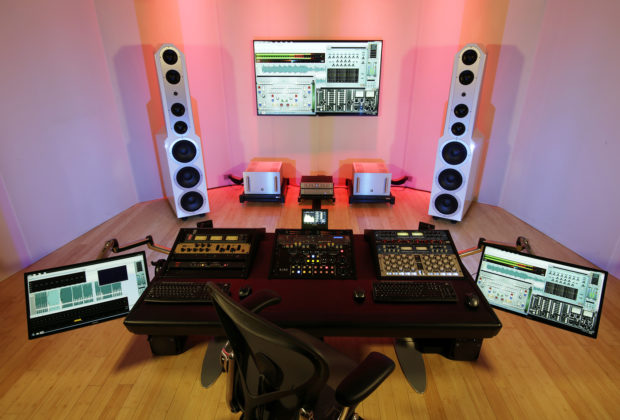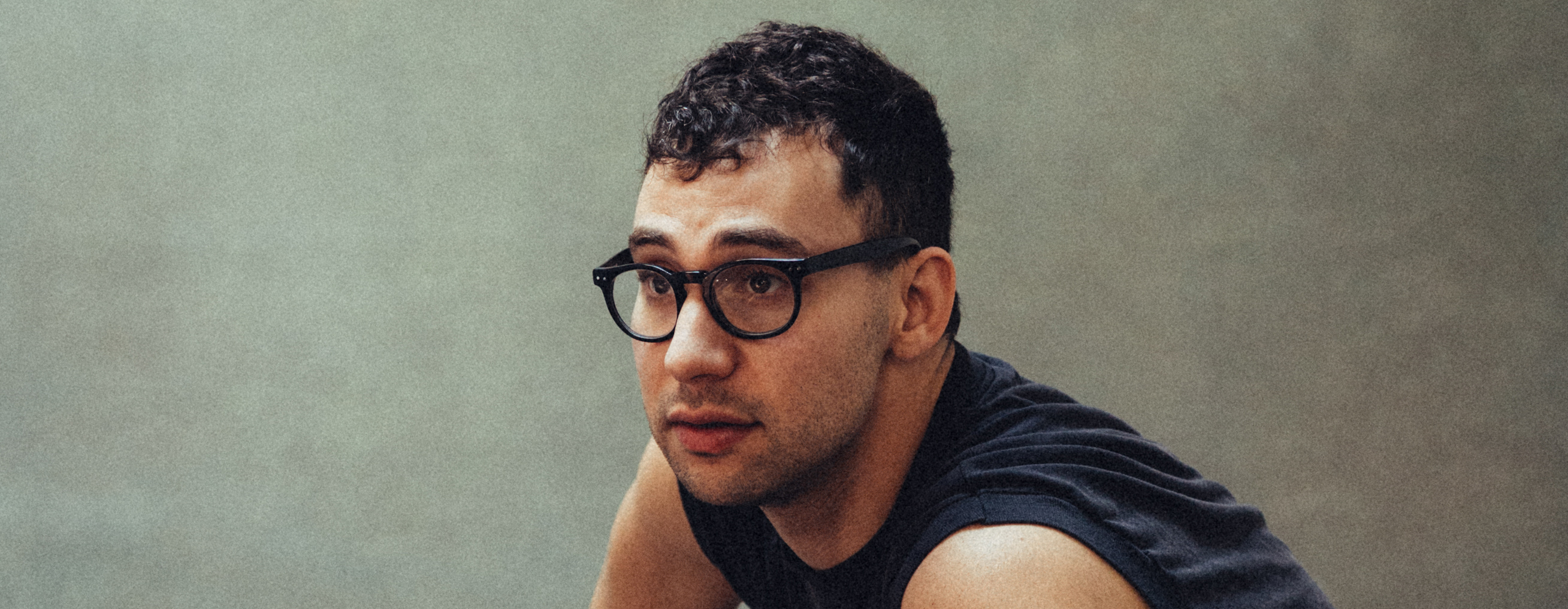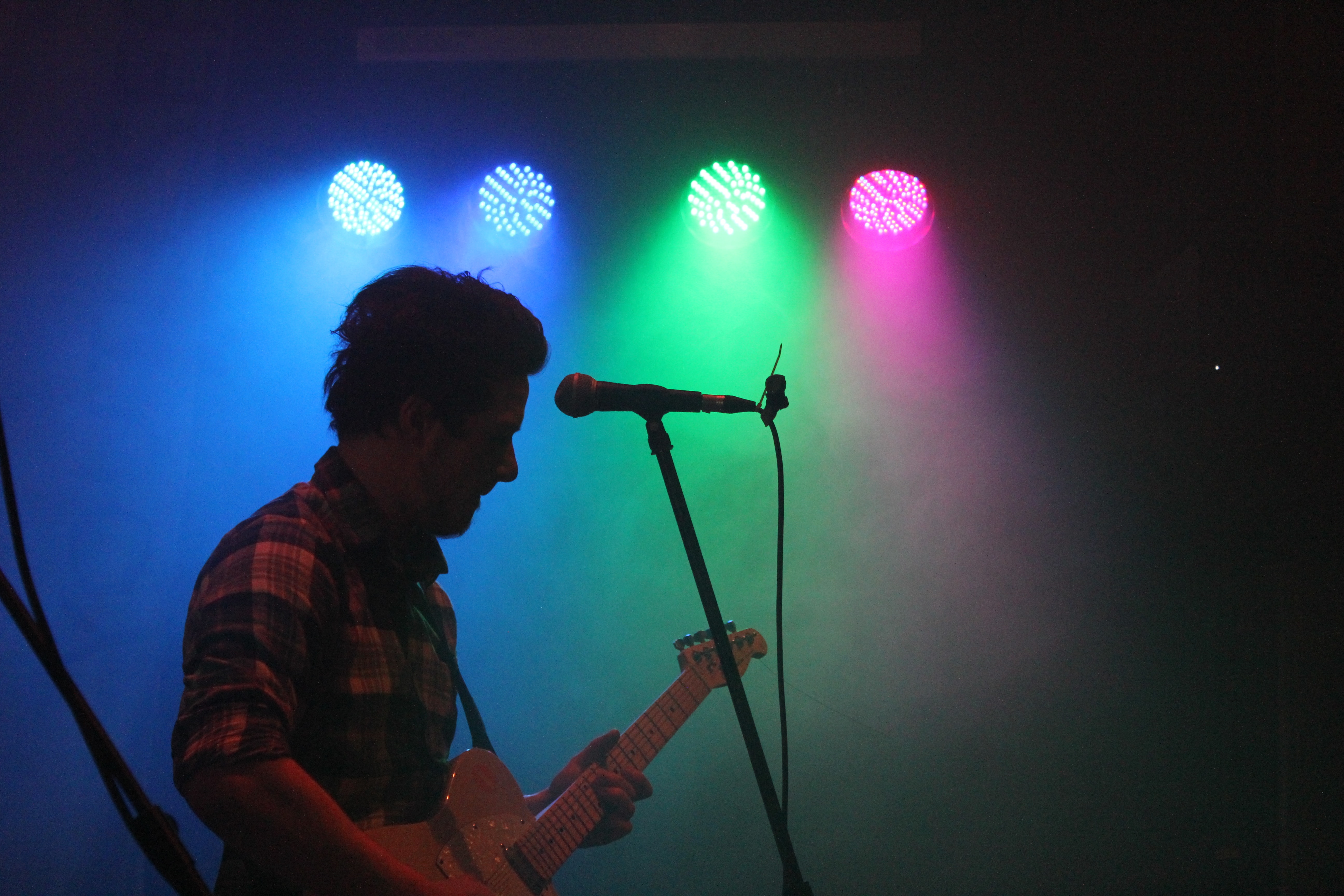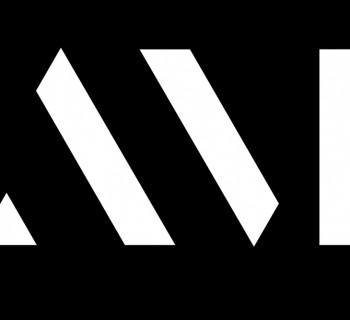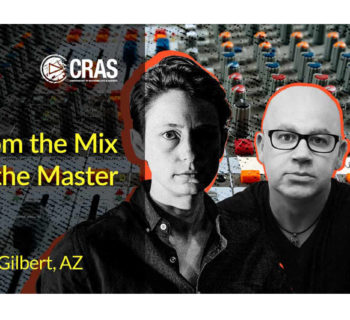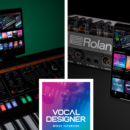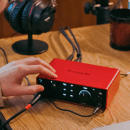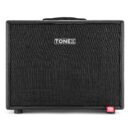Feature photo: Colin Leonard's mastering suite at SING Mastering with custom-built Egglestonworks Ivy monitors.
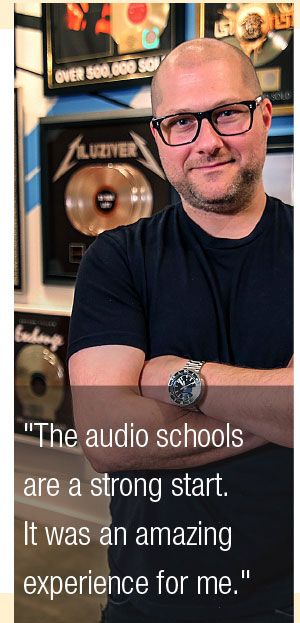 Colin Leonard
Colin Leonard
Company: SING Mastering
Clientele: Cardi B, Beyoncé, Justin Bieber
Contact: singmastering.com
Atlanta-based mastering matador Colin Leonard set foot into the field after he graduated from Full Sail University in 1997 and then completed his own band’s masters the following summer. When the opportunity arose to work in a studio, he found mastering’s allure irresistible. Highly versed in vinyl, he’s cut lacquer masters since 2006, notably on SING’s 1969 Neumann VMS-66 paired with a DJR computer. Leonard also owns Aria Mastering, an analog robotic mastering service and has mastered a number of Grammy-winning records. Often, remasters crop up, as with his recent record with jazz artist Philippe Saisse.
Are present-day artists more technically savvy or less?
Most of the bigger artists have their own engineers and then they hire an additional mixer. The majority of them are good at what they do, so normally I don’t talk to the artist. I’m in touch with his or her personal engineer.
If you could build your ideal mastering room, what would go into it?
I sort of have it now with my custom, handmade EgglestonWorks Ivy loudspeakers. They’re amazing—like, seven feet tall and about 800 pounds apiece. There are 19 drivers in each speaker and they’re powered by big Cello amplifiers. I believe it’s the only set that uses active crossover on the low-frequency drivers. I can completely adjust the low-frequency crossover electronically with a Pass Labs electronic crossover.
To what extent has online streaming influenced your work?
Not a lot. There are a few things: Apple Digital Masters [formerly Mastered for iTunes] and little level options that make things sound better through streaming. Other than that, I think about how things will translate and I constantly monitor the various services––for my stuff and other people’s.
What are the best reasons for artists to attend mastering sessions?
It’s good to establish a relationship with the mastering engineer and to ensure that an artist is comfortable with them.
What are the best reasons for artists not to attend mastering sessions?
Once you have a relationship with an engineer, it’s not necessary. It’s important that you listen in the environment that you’re used to.
How much of your business is done online?
All of it, really. I can’t remember the last time someone brought in a CD or hard drive. Even if a client comes in, the files still come online.
When you begin work on a track, is your first instinct about it usually correct?
I hope so. I’ve done this on so many songs so I can tell quickly what needs to happen. It takes a long time to develop that. But now things come together pretty quickly.
How do you help clients communicate what they want from you?
It’s important for a good engineer to read between the lines. In the age of internet music, there isn’t a lot of [spoken] communication. So you need to be a student of what’s going on in multiple genres and be able to hit the mark properly the first time. Artists don’t give me a lot of input unless it’s a mix engineer.
Formal engineering education programs increase regularly. Are there already enough?
The audio schools are a strong start. It was an amazing experience for me and I learned from experienced engineers. It’s like any school: you get out what you put into it. I did as many sessions as possible while I was there.
Has automated mastering taken work away from engineers?
It hasn’t. It’s a common misconception that it will. Most of those comments are from people that don’t master much. In reality, they’re different products. Often mix engineers use them as a reference for their clients. It’s also used on projects where artists don’t have the time or budget for professional mastering, and if the automated stuff didn’t exist they’d probably release it as is or put a limiter on it. But since these things have come along, my business has increased a lot.
Do you use the best monitors available or is it better to listen through gear comparable to what a typical artist uses?
You want to have a full-range monitoring system: a 20 Hz to 20 kHz monitor with a soft dome tweeter is your best bet. Using a hi-fi-type speaker like the EgglestonWorks will give you a better representation of how a track translates to the outside world. They’re more extended on the top and bottom than a mixing monitor, which focuses more on the midrange.
Has the field of mastering improved in terms of sound in recent years or is there still pressure for music to be loud?
It’s definitely improved. The good stuff now sounds great. Part of that is technology, part is people learning more. Some stuff is loud, but that’s always going to be the case. •

Pete Doell
Company: Aftermaster Studios
Clientele: Ray Charles, John Waite, Toto
Contact: aftermaster.com
Veteran mastering engineer Pete Doell has put the finishing sheen on records since he joined the industry in the ‘70s. On the heels of nearly two decades of service with Capitol Records, he spent several years with Universal Mastering. But when its LA mastering department shuttered nearly four years ago, Doell made a seamless transition to Aftermaster Studios when he began work the following Monday in a room that he deems nearly ideal. Notably, Aftermaster makes an automated mastering plug-in designed by Shelly Yakus, engineer, former VP at A&M Records and co-founder of Aftermaster.
Are present-day artists more technically savvy or less? Moreover, is it important that they be?
A number of artists have gotten hip to the fact that you don’t have to strangle the emotion and excitement out of a performance to get it heard. Hopefully, dynamics will begin to come back in a big way. The streaming services have helped us make good-sounding music because they impose a penalty if you submit a file that’s too loud. But I like to think that most artists still respect and trust the professionals.
If you could build your ideal mastering room, what would go into it?
The shape is a lot of it, but the most important thing is the accuracy of what you hear. The acoustic treatment of the room matters. I spent several days before I started to work [at Aftermaster] to fine-tune the position of the speakers so that the size, imaging and tonal balance was just the way it should sound without any EQ. If you just put up expensive speakers and then jump on the EQ, you’ll fool yourself.
What are the best reasons for artists to attend mastering sessions?
If you’ve never been to one, it’s informative to share what you expect the process can do for you. We’re not able to change your mix, but we can change the perception of it. It’s also a good time to make sure that we understand your artistic vision. If your music is hard to pigeonhole, you can come and describe some of your influences and maybe bring some examples.
What are the best reasons for artists not to attend mastering sessions?
Money. It takes much less time if you’re not here. If you’re going to turn over rocks because a record doesn’t sound quite the way you expected [at home or in your car], some of that is because those other reference points aren’t as accurate as a mastering room.
When you begin work on a track, is your first instinct about it usually correct?
It depends. If it’s a seven- or eight-minute song, you may get an impression in the first 32 bars. When you get to the end of the track, you may have to re-evaluate. If something starts soft and then gets humongous at the end, the way you make it so it doesn’t sound completely anemic is you elevate the beginning and then find a spot before the giant build at the end. You can start the whole thing up three or four dB and have it gradually decrescendo so you don’t really notice it. As far as internal dynamic surprises, that happens. But most of the time, within the first 30 seconds you’ll get a good idea of what a track needs.
How do you help clients communicate what they want from you?
I have a checklist for new clients, most of which is about the deliverables. If something falls through the cracks, it’ll cost them time and money. We need to get clients to reveal everything they need and expect.
Formal engineering education programs increase regularly. Are there already enough and/or are artists better off learning the craft on their own?
Learning your skills from reading or watching YouTube videos is helpful but there’s no substitute for sitting at the feet of Al Schmitt or Elliot Scheiner, hear these amazing things and see how much or how little they do.
Has automated mastering taken work away from engineers? Has it gotten better over the past few years?
My job is kind of doomed; it will be taken over at some point by automation.
Do you use the best monitors available or is it better to listen through gear comparable to what the average person uses?
There is room to listen on multiple sets of speakers to hear how something translates. Here I have these spectacular Lipinski monitors because the room is so small––they’re all five feet away from me so the imaging is unbelievable. Occasionally I’ll make a disc to play in my car, but I’ve yet to think “This sounds way different than I thought it did.”
Has the field of mastering improved in terms of sound in recent years or is there still pressure for music to be loud?
The stuff on the airwaves is superior sounding and technology continues to march on. There are better-sounding converters coming around every few years. Stuff that sounded great a decade ago sounds like dog meat compared to the possibilities of today.•
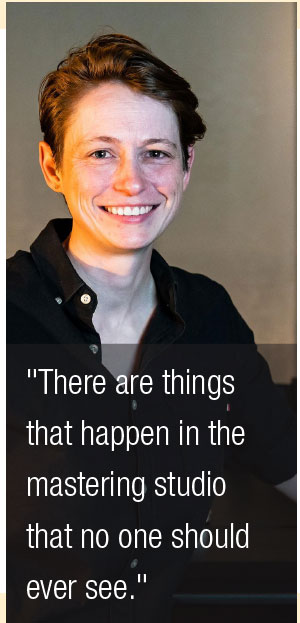 Piper Payne
Piper Payne
Company: Neato Mastering
Clientele: Madame Gandhi, Third Eye Blind, Cartoon Network
Contact: neatomastering.com
Piper Payne launched her mastering career after she earned her BFA in music with a minor in electronics. Payne delved even deeper when she enrolled in a master’s program in Norway with a focus on classical recording engineering. An assistant position with legendary engineer Bob Katz led, ultimately, to the construction of Neato Mastering, her own room in Oakland, CA. She now divides her time between Neato and Nashville’s Infrasonic Mastering, an outfit she joined forces with in the spring of 2019. There she often works with what she considers the finest cutting lathe in existence: the Neumann 32b.
Are present-day artists more technically savvy or less?
Yes and no. But at its core, the way records are made is the same. I’m all about empowering artists. So my inclination is for them to be extremely informed about what happens to their music after it leaves my hands. Do they have to know everything about the mastering process? No. They just have to trust me. To build that trust, a lot of my onboarding process is educating my client.
To what extent has online streaming influenced your work?
Streaming has made it easier for artists to make records, so it’s easier for me to have more clients. I can listen to my music in almost real time. It’s like shining a mirror back on my technical skills. I can make a song sound good by hitting a service’s loudness target. If I make it really loud, it’s not going to sound good next to other songs and a client won’t like it anyway.
What are the best reasons for artists to attend mastering sessions?
Artists have spent many years and their life savings on making their record and I can finally say to them “This is your project; this is what you’ve been working on. We’re almost done.” That feeling is super fun.
What are the best reasons for artists not to attend mastering sessions?
There are things that happen in the mastering studio that no one should ever see. If an artist is super close to a project, attends a session and sees me clean the pops and clicks of bad edits or a little distortion in the vocal, they can never unhear it. Half the time they’re grateful and the other half they go back and fix the problems and then I’ll have to remaster it. That’s not good for anyone. As to attending or not attending, a combination is good. Come in for the sequencing and maybe the last few songs, a consultation before and after the session or attend an online session.
How much of your business is done online?
Most of it. Often clients will send me something and then call to elaborate, which is great. The best mastering session is either 100 percent in person, which isn’t feasible, or have it all done by email. It’s rare for someone to drop off a hard drive.
When you begin work on a track, is your first instinct about it usually correct?
Yes. Sometimes it’ll be 90 percent there and we’ll have to make a couple of adjustments, either to the entire record or just a few songs, but most of the time I’m right. Only in the last few years have I had the confidence and immodesty to say, “Yes, I know what it’s supposed to sound like.”
Are there already enough formal mastering engineering education programs?
Are engineers better off learning on their own? Not now. There’s too much information out there and not enough mentors. Gone are the days when you could knock on every door in Los Angeles and find a badass who would take you under their wing. Now there are too many young folks vying for the attention of not enough well-trained professionals.
Has automated mastering taken work away from engineers? Has it gotten better over the past few years?
It has and will continue to get better. It has not affected my business in any way. If anything, it’s called attention to what it means to have a human being working on things that human beings listen to.
Do you use the best monitors available or is it better to listen through gear comparable to what a typical artist uses?
Listen on the very best monitors in the best-tuned room you can get. Grab the finest equipment you can afford and upgrade when you can manage something better. There’s always someone who will buy your Apollo or KRKs.
Has the field of mastering improved in terms of sound quality or is there still pressure for music to be loud?
Mixing has changed a lot more than mastering. I’m getting better-sounding mixes because there are more tools for budding mix engineers. The sound and quality is better, [but] it fools more people into thinking that they’re better at what they do. •
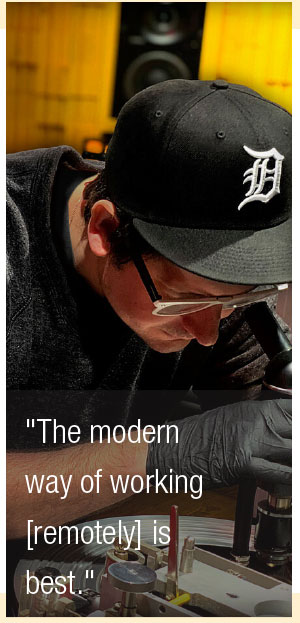 Bill Skibbe
Bill Skibbe
Company: Third Man Mastering
Clientele: Franz Ferdinand, Jack White, The Black Keys
Contact: thirdmanmastering.com,
Billskibbe@thirdmanrecords.com
Bill Skibbe began his career in Chicago during the mid-‘90s. His first foray into the music business proper came when he joined well-known indie label Touch and Go Records. As a member of various bands, Skibbe learned much of the mastering craft on his own and has worked with a range of talent that includes many Grammy-winning artists. He also had a hand in the construction of Steve Albini’s Electrical Audio as well as John McEntire’s original Soma Electronic Music Studios. In total, Skibbe has built five studios over the years and now works out of Detroit’s Third Man Mastering.
Are present-day artists more technically savvy or less? Moreover, is it important that they be?
They’re definitely not. We’re not dealing with the same level of professionals as we did in the ‘90s. I see all kinds of files come in, especially for cutting. Every record that comes in I have to do some sort of mastering on it even if clients say, “This is going to be a flat cut,” I still have to make it fit. Some of the stuff that comes in is out of control. But I don’t ever slight the record. I just make it work.
If you could build your ideal mastering room, what would go into it?
Right now I feel like I don’t need anything else. I might get a Maselec or Fairman tube EQ. I’ve got a nice old Sontec and my Esoteric 660s. They sound fantastic even running through without hitting them. It adds some kind of top-end magic. I enjoy the signal chain here now.
To what extent has online streaming influenced your work?
This studio is full-service, so we master for digital and analog. We’re primarily a vinyl studio because we’re connected to the record plant. But I master for iTunes all the time and I still do digital files even for records that I’m cutting: streaming files ready for Spotify.
What are the best reasons for artists to attend mastering sessions?
The best reason is so that they can make decisions at the immediate time. But I don’t recommend it anymore.
What are the best reasons for artists not to attend mastering sessions?
The modern-day way of working––where clients send files and then revisions are done after the fact––is best. When you go into a studio you’ve never been to before, you don’t understand the monitoring system. That’s true if you’re producing or just listening. You can’t tell what’s happening on their monitors even if they’re super clear because you’ve never listened on them before. If you have a rapport with a mastering house and you've attended multiple sessions as a producer, you're going to know the outcome of the engineer's work and you'll be able to go in and reference on their monitors. But [to develop that] takes time. Also, when you attend, it slows down the mastering engineer.
How much of your business is done online?
A third of it, which is from third-party customers. The other two-thirds is through the record plant or Third Man directly––probably a third each.
When you begin work on a track, is your first instinct about it usually correct?
If you’ve worked with someone before, you have a rapport with them and you’ll know how they’ll want it; you’re inside their head. I do what I want immediately––my initial impulse––and then send the client a reference. If they like it, I know I’m on the right track. Track-record-wise, it’s probably 75 percent of the time I’m right.
How do you help clients communicate what they want from you?
You begin right away by conversing with them. One of the questions you ask up front is, “What are you hearing out of this? Do you want it to be super loud, super full-frequency?” Most of the time, you do your work and start to listen to [clients] during the revision chain.
Are there already enough formal mastering engineering education programs?
It depends on how you learn. When you produce a record, you’ll see people with all sorts of talent levels. But it doesn’t translate to how successful their band becomes or how good their music is. I didn’t come up through any kind of formal education in audio. I learned by taking things apart, by being in bands and conquering problems out of my own drive. But I’ve met a lot of engineers who went to sound school and they’re great.
Has automated mastering taken work away from engineers? Has it gotten better over the past few years?
People who are going to use automated mastering have a certain mindset and probably wouldn’t be inclined to pay an engineer to master anyway. I don’t believe it’s taking anything away from anybody. It’s also about imparting taste and a sound.
Do you use the best monitors available or is it better to listen through gear comparable to what a typical artist uses?
We’ve got Atomic SixTens, which are made in Detroit. They're accurate monitors although they're not super clean. They articulate well, have depth and power amps so they don't clip easily. They're clean on the top end and translate well to the outside world.
Has the field of mastering improved in terms of sound in recent years or is there still pressure for music to be loud?
There’s still a loudness war going on, it’s all about being competitive and it’s prevalent in the world of vinyl. People feel that their record isn’t loud enough and I’ll say, “It’s a 24-minute side! Do you want it to sound good or do you want it extremely loud?” I’ve had clients where I couldn’t cut it loud enough for them. But it works well for certain types of pop: it’s smashed to bits, has no dynamic range but it sounds amazing. In rock you want to have dynamics. •

